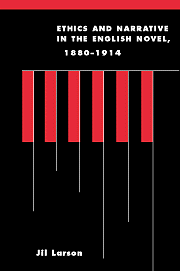Book contents
- Frontmatter
- Contents
- Acknowledgments
- 1 Ethics and the turn to narrative
- 2 Victorian history and ethics: anxiety about agency at the fin-de-siècle
- 3 Emotion, gender, and ethics in fiction by Thomas Hardy and the New Woman writers
- 4 When hope unblooms: chance and moral luck in A Laodicean, The Mayor of Casterbridge, and Tess
- 5 Oscar Wilde and Henry James: aestheticizing ethics
- 6 Promises, lies, and ethical agency in Joseph Conrad's Under Western Eyes
- Afterword
- Notes
- Bibliography
- Index
2 - Victorian history and ethics: anxiety about agency at the fin-de-siècle
Published online by Cambridge University Press: 22 September 2009
- Frontmatter
- Contents
- Acknowledgments
- 1 Ethics and the turn to narrative
- 2 Victorian history and ethics: anxiety about agency at the fin-de-siècle
- 3 Emotion, gender, and ethics in fiction by Thomas Hardy and the New Woman writers
- 4 When hope unblooms: chance and moral luck in A Laodicean, The Mayor of Casterbridge, and Tess
- 5 Oscar Wilde and Henry James: aestheticizing ethics
- 6 Promises, lies, and ethical agency in Joseph Conrad's Under Western Eyes
- Afterword
- Notes
- Bibliography
- Index
Summary
Theory is required to support observation, just as much as observation theory.
Alasdair MacIntyreSelfhood and the good, or in another way selfhood and morality, turn out to be inextricably intertwined themes.
Charles TaylorDespite all the emphasis on particularity, context, and narrative in recent studies of ethics and literature, scholars working in this field have directed surprisingly little attention to the question of why an ethical problem or set of ethical concerns dominates in narratives written during a given historical period. Such historicizing might be avoided for the simple reason that identifying the moral pre-occupations of an era represents only the beginning for an ethical critic and immediately begs several questions. My claim, for instance, that anxiety about agency during the British fin de siècle determines in a variety of ways the ethical sensibility of late Victorian and turn-of-the-century novels gives rise to a question about history – how are the ethical issues of these novels distinctively different for their time? – as well as to a number of theoretical inquiries about the value of understanding ethics as historically contingent, inquiries that concern the existence of moral absolutes and the validity of universal claims about virtue.
Any satisfying answer to these questions would entail a complex explanation of both the relationship between history and ethics and the historical and cultural context of Victorian ideas about will, agency, and determinism, not to mention nineteenth-century conceptions of selfhood.
- Type
- Chapter
- Information
- Ethics and Narrative in the English Novel, 1880–1914 , pp. 20 - 43Publisher: Cambridge University PressPrint publication year: 2001



